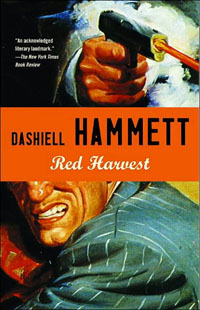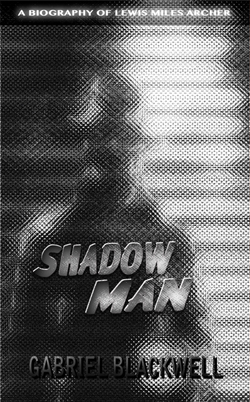A Book To Read In Times Like These: Dashiell Hammett’s Red Harvest
 Red Harvest
Red Harvest
by Dashiell Hammett
Vintage, 1989
224 pages / $14 Buy from Amazon
We’re finished with another election cycle and it’s all same old, same old. For months we’ve been overrun by the expected crap, the lies, corruption, false promises, and general deception. While it might be nice to escape into something delightful, something by Eric Kraft or an imaginative dance like Italo Calvino’s The Baron In The Trees, if you want to read a book that stabs into the thick of the American political scene, then Dashiell Hammett’s first novel is what you need to get your claws on asap. It’s a novel that reminds you how unpleasant politics has always been. Plus, it’s got a lot of great zingers.
There’s a point when Dashiell Hammett’s Red Harvest stops being a detective story and turns into a blood bath. It’s at this point where the novel switches from being a regular tale of intrigue and personal conflict and turns into a masterful portrait of political corruption and violence. Halfway through, our man The Continental Op does a body count. “There’s been what?” he asks the devious dame Dinah Brand. “A dozen and half murders since I’ve been here.” He lists the dead and says, “That’s sixteen of them in less than a week, and more coming up.” The Continental Op copes the way they all used to. He gets drunk, takes some laudanum, and for an instant feels the rosiness of the world. He wakes up with another dead body on his hands. Another morning, another body, another hang-over. It’s a lesson in how any place or day can become a hell-trap. “If I don’t get away soon,” our man says, “I’ll be going blood-simple like the natives.”
Red Harvest is a great political novel because in the end its characters care about only one thing: power. There are no beliefs, no ideologies, no speeches. There’s just power. There are interpersonal squabbles over who killed whose brother or son, but these get forgotten in the struggle over who gets to control the quaint, ruined town of Personville, aka Poisonville. Our man The Continental Op is the only operator interested in salvaging a bit of justice from this wreckage. He sets the mobsters, police, and political head honcho up against each other and keeps prodding until more murders get committed. There’s the usual assortment of baddies and toughs, Pete the Finn, Lew Yard, Whisper, police chief Noonan, and Old Elihu, who’s the most vicious of them all and also The Continental Op’s employer.
February 8th, 2013 / 12:00 pm
Weston Cutter interviews Gabriel Blackwell
 I’m a huge admirer of Gabriel Blackwell — as prose editor at Noemi Press, I’m publishing his book of short fiction Critique of Pure Reason very soon, and I’ve published a piece of his body of work in almost every venue I’ve gotten my hands on. What I mean to say is that I can vouch for him as a writer and as a human being, and that you should also check out his novel Shadow Man, about which Weston Cutter has interviewed him. Here is Weston’s introduction, and their interview:
I’m a huge admirer of Gabriel Blackwell — as prose editor at Noemi Press, I’m publishing his book of short fiction Critique of Pure Reason very soon, and I’ve published a piece of his body of work in almost every venue I’ve gotten my hands on. What I mean to say is that I can vouch for him as a writer and as a human being, and that you should also check out his novel Shadow Man, about which Weston Cutter has interviewed him. Here is Weston’s introduction, and their interview:
Gabriel Blackwell’s Shadow Man: a Biography of Lewis Miles Archer arrived in black and white. I mean that both the galley copy was not full color, and that the book offers itself as a thing in or amidst a noirish fog, like some old cinematic masterpiece. Here’s how it starts: “Lewis Miles Archer, or anyhow the man known to creditors and clients as Lewis Miles Archer for just long enough to build up a respectable sheet of both, was born sometime between 1879 and 1888, somewhere in the shadow of Lake Michigan.” What Blackwell’s doing with this sort of dancing-away imprecision (four different states, for instance, could claim regions in the shadow of Lake Michigan) is crafting a slippery-but-detailed-as-possible biography of a fictional character. What actually happens to you as you read is you feel the line between ‘real’ and ‘fiction’ slipping, twisting and going porous in ways that, at least to this reader, become unsettling in fantastic ways: one less reads Shadow Man than goes into it and, later, comes out from it. It’s a hell of a thing. Gabe and I recently batted a single round of questions back and forth, hoping we’d get into more questions but then, after the first round, realizing 1) we’d gotten done what we’d hoped and 2) life intrudes.
Weston Cutter: Were there any rules in how you composed this book? In other words, did you keep 100% fidelity to the fictiveness of fiction and the ‘reality’ of reality? And how did this book end up taking the form it did? I guess mostly this question’s one rooted in fascination, one writer to another saying: how the fuck did you even find the trail that let you even begin to walk toward the result that is this book? How does one do that?
Gabriel Blackwell: I don’t think I thought of them as rules, but I guess they could be viewed that way—I created none of my characters and tried as much as possible to put the events from my texts (Raymond Chandler’s The Big Sleep, Dashiell Hammett’s The Maltese Falcon, and Ross Macdonald’s The Moving Target) into new contexts rather than invent other events to suit the narrative. But those didn’t seem like rules—I was just trying to write a book that worked in the way that I wanted this book to work. Shadow Man, which has to do with inheritance and imitation, needed to be a node rather than a terminal, a book that pointed outside of itself in constructive ways. I like lots of terminal fictions, books that assert that what they are describing is to be believed for the duration of their story and no further, books that begin and end inside the author’s head. But it’s rare that I’m actually caught up in those books; I’m always conscious of the writer playing house with me. That tends to take me out of it. I don’t want to read a transcript of someone playing with paper dolls, not if it isn’t really compelling. READ MORE >
It is Friday: Go Right Ahead
![]()
![]()
 I’d feel better if you drank your drink.
I’d feel better if you drank your drink.
I like to laugh smoke out.
You’re drunk, and I’m drunk, and I’m just exactly drunk enough to tell you anything you want to know.
Stupidly calm.
Now I am dangerous.
Drunk, yes, but so what?
I want to try cocaine, though because that’s suppose to sharpen the brain, isn’t it?
Stop waving your hat in my face.
Feed the lettuce to the bunny and eat the bunny.
